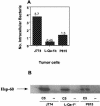Bacterial and host factors involved in the major histocompatibility complex class Ib-restricted presentation of Salmonella Hsp 60: novel pathway
- PMID: 15102795
- PMCID: PMC387849
- DOI: 10.1128/IAI.72.5.2843-2849.2004
Bacterial and host factors involved in the major histocompatibility complex class Ib-restricted presentation of Salmonella Hsp 60: novel pathway
Abstract
Previously, a peptide epitope derived from the Hsp 60 molecule of Salmonella that is presented by the major histocompatibility complex (MHC) class Ib molecule Qa-1 to CD8(+) cytotoxic T cells (CTLs) was described. In the present study we investigated the Salmonella-induced processing and presentation pathway for generating this Qa-1-restricted epitope. Live bacteria and, to a lesser extent, opsonized heat-killed bacteria are able to sensitize target cells for lysis by Salmonella-specific CTL. In contrast, heat-killed bacteria cannot sensitize target cells. Presentation of the Hsp 60 epitope appears independent of bacterial internalization, because cytochalasin D does not affect presentation. Moreover, Salmonella strains defective in the InvA or InvE operon, two critical components of the type III secretion pathway, are as efficient as wild-type Salmonella enterica serovar Typhimurium in sensitizing infected targets to lysis. Collectively, these results suggest the existence of a novel antigen-processing pathway in which exogenous antigens gain access to the cytosolic MHC class I processing machinery. Considering the abundant nature of bacterial Hsp 60 and the upregulation of this protein after Salmonella infection of eukaryotic cells, this mode of antigen presentation may be particularly relevant to understanding the host defense mechanisms against gram-negative bacteria.
Figures







References
-
- Ben-Zvi, A. P., and P. Goloubinoff. 2001. Review: mechanisms of disaggregation and refolding of stable protein aggregates by molecular chaperones. J. Struct. Biol. 135:84-93. - PubMed
-
- Brown, M. L., P. E. Fields, and R. J. Kurlander. 1992. Metabolic requirements for macrophage presentation of Listeria monocytogenes to immune CD8 cells. J. Immunol. 148:555-561. - PubMed
-
- Brumell, J. H., A. J. Perrin, D. L. Goosney, and B. B. Finlay. 2002. Microbial pathogenesis: new niches for salmonella. Curr. Biol. 12:R15-R17. - PubMed
-
- Buchmeier, N. A., and F. Heffron. 1990. Induction of Salmonella stress proteins upon infection of macrophages. Science 248:730-732. - PubMed
Publication types
MeSH terms
Substances
Grants and funding
LinkOut - more resources
Full Text Sources
Research Materials

